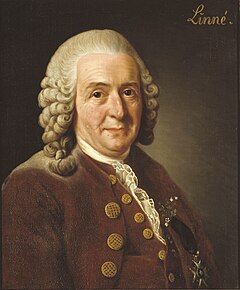Born in Southern Sweden in the countryside of Småland, Linnaeus would become one of the most acclaimed scientists of his time in Europe.
Originally studying to become a doctor, he studied in many places in Europe such as the University of Uppsala and the University of Harderwijk, in the Netherlands. During the time of his higher studies, he did take some time out for travelling. On one expidition, crossing the 4600 miles of the Scandinavian Peninsula on foot, it is said that he discoved around 100 species for botany.
People of the time were looking for ways of classifying things, plants included, and Linneaus thought he'd found a way to do this. Linneaus created a classification of plants based on their sexual parts and published a book called Systema Naturae, while he was in the Netherlands, to get his ideas noticed. There was a lack of acceptance of this method, and while some botanists did begin to use the system, it fell out of use because it was an artifical system and didn't relate to the relationship and development of each species.
However, the Systema Naturae continued full force naming 7700 plant species and 4400 animal species in a system called binomial nomenclature. He is quoted as saying "God created – Linnaeus arranged". And this is where the man really made his mark. Condensing plant names from, a mind boggling 20 names, to just two was a stroke of genius. His wasn't the first system of binomial nomenclature, the Bauhin brothers had developed a system several centuries earlier, but his was the most consistent in its used and was able to popularise its use.
The Linnaean system, within which this nomenclature was utilised, used a brilliant nested hierarchy began with Kingdoms before moving down to Orders, then to Genus and finally Species. These days there have been some alterations to the system. An example of the modern day system is as follows:
Division : Angiosperms
Class : Magnolids
Order: Magnoliales
Family : Magnoliaceae
Genus : Magnolia
Species : Stellata
 The success of this system has lead to every botany or zoological student hearing the name of Linnaeus. His success has meant that every name used before this system had no validity and has provided a foundation for the development of nomenclature. This has included the advent of many codes, for instance, the International Code of Zoological Nomenclature. There are some rather strange rules, for instance while the zoological system allows animals to have the same genus and species name, pica pica for Starling for example, the ICN plant Code does not!
The success of this system has lead to every botany or zoological student hearing the name of Linnaeus. His success has meant that every name used before this system had no validity and has provided a foundation for the development of nomenclature. This has included the advent of many codes, for instance, the International Code of Zoological Nomenclature. There are some rather strange rules, for instance while the zoological system allows animals to have the same genus and species name, pica pica for Starling for example, the ICN plant Code does not!There are some very sensible rules though, for instance if there is a duplicate name in the system, then the oldest gets to keep the name - the new comer must find another unique name.
It is often said that Linnaeus would take out his students on wonderful botanic walks, shouting the names of the plants and creating an intoxicating atmosphere that allowed all students to learn with great success. Indeed some of his students went on to become some of the great plant hunters, including the wonderful Carl Thurnberg. Linnaeus also experimented with a system whereby you could tell the time by using flowers, called a floral clock. More information on this wonderful experiment can be seen on the PDF from the Linnean Society.
I wonder what Linnaeus would think of botany and taxonomy, this wonderful categorisation and organisation of things, in this day and age. We've come such a long way. I think he'd be quite happy that plants haven't yet yielded all of their secrets to us, but happy that they continue to be our saviours. I hope he's be happy that English, as of this year, can now be used when describing a new plant - speeding up the process of officially naming plants, some of which are on the brink of extinction. The extinction fact is something I imagine he would have been irrate about - how can you create and understand order if you're missing some of the pieces. With 50% of new botanical finds being found by 2% of plant hunters - should we be financing more plant hunters as Linnaeus himself did?
While I can only speculate on the thoughts and feelings of this great botanical and taxonomic figure, one thing I can be sure of is the long lasting beneficial effects of his system. As I recently read in David Attenborough's Life on Air:
"'Apa?' I said, meaning - what kind of bird?
His answer to that, however, defeated me. He repeated it several time but I was baffled.
Then he said 'Irena puella puella.' And that I understood immediately. It had been a fairy bluebird.
...
I was delighted by rhe thought that he, who had never left his native Borneo, and I, a stranger from England, should have been able to make ourselves mutually understood."
Without Linnaeus and his perseverance in consistently naming species with the binomial system, Attenborough and all of us would struggle to make ourselves mutually intelligible on such matters - not just across countries and continents, but sometimes across county borders. Thank you Linnaeus.



No comments:
Post a Comment
I really enjoy reading and replying to your comments, but please do not use this space for advertising!